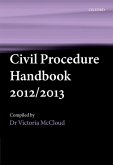Civil procedure law is integral to our understanding of access routes to justice, dispute resolution, and ultimately the rule of law. However, the field is rapidly changing, shifting dispute resolution away from courts and judgments, towards other legal pathways such as negotiation, mediation, arbitration and Ombudsman. Similarly, the increasing digitisation of society and looming potential of AI will profoundly influence future reforms. Civil justice is thus at a critical turning point. In response, John Sorabji proposes a new model civil procedure code for England and Wales. Building on the work of the ALI/UNIDROIT Principles of Transnational Civil Procedure and the ELI-UNIDROIT Model European Rules of Civil Procedure, he articulates a simplified, principle-based, seventeen-part approach that covers all major stages from issue to enforcement, with sections on costs and funding, provisional measures, access to evidence and privileges, case statements, hearings, and dispute management. Highlighting that civil courts are just one part of a wider civil justice ecosystem, Sorabji promotes the wealth of avenues available for dispute resolution and charts how these should be co-ordinated in the future. He outlines new ways to efficiently incorporate breakthroughs in digitisation and preventive and consensual forms of justice, and also explores likely shifts in the purpose of procedural codes as digitisation evolves, while underscoring the consistent need for judicial independence and accountability. Ultimately, Sorabji posits that procedural codes should guide not only the process of litigation, but those who design digital procedures and test their propriety in the future.
Dieser Download kann aus rechtlichen Gründen nur mit Rechnungsadresse in A, B, BG, CY, CZ, D, DK, EW, E, FIN, F, GR, HR, H, IRL, I, LT, L, LR, M, NL, PL, P, R, S, SLO, SK ausgeliefert werden.









